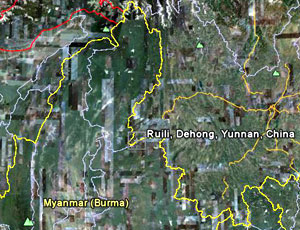Arrests and beatings of Burmese by Chinese police, in Ruili, China’s main trade centre on the Burma border, have increased right after Burma’s President U Thein Sein returned from his three-day visit to China on May 29, according to Burmese in Ruili.
Both legal and illegal Burmese workers and traders in Ruili (or Shweli) have been treated harshly by Chinese police and the Border Guard Force for nearly a week, since U Thein Sein’s departure from China, said Burmese workers in Ruili.
Sources said many Burmese have been hospitalized at Ruili after being beaten by Chinese authorities, while over a hundred legal and illegal Burmese have been jailed in the police prison in Ruili.

Some were arrested for using drugs after urine tests. However, some innocent people were beaten and put in jail without being given a reason, the sources added.
A Kachin politician in Ruili told the Thailand-based Kachin News Group today, “It is significant. Both Burmese citizens who hold Chinese Border Passbooks and non-documented Burmese are suddenly stopped and beaten when they are coming back to the Burmese side, by Chinese police and the Border Guard Force”.
Moreover, Burmese motorcycle traders (who buy a motorcycle from China and drive it back to Burma to sell) are being stopped on the road by police, beaten and arrested before they cross into Burma. And, their motorcycles are detained, according to eyewitnesses.
Ruili, opposite the main trade town of Muse in Burmese side, is the largest border trade corridor between the two countries and it is also the largest market of famous Hpakant jade, from Burma’s Northern Kachin State.
This harsh treatment by Chinese authorities is very unusual and confusing to Burmese traders and residents in Ruili, Burmese traders added.
Speculation is spreading among Burmese in the border trade town that the harsh treatment is being implemented at the instruction of Burmese President, U Thein Sein.



